(完整版)一般现在时表将来的几种情况(可编辑修改word版)
- 格式:docx
- 大小:16.59 KB
- 文档页数:4
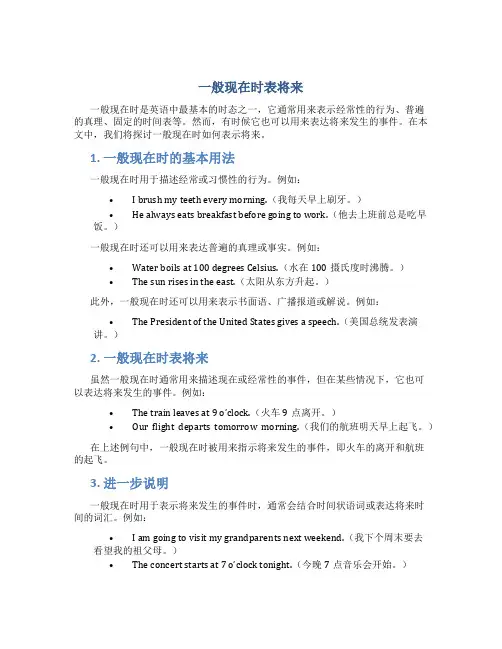
一般现在时表将来一般现在时是英语中最基本的时态之一,它通常用来表示经常性的行为、普遍的真理、固定的时间表等。
然而,有时候它也可以用来表达将来发生的事件。
在本文中,我们将探讨一般现在时如何表示将来。
1. 一般现在时的基本用法一般现在时用于描述经常或习惯性的行为。
例如:•I brush my teeth every morning.(我每天早上刷牙。
)•He always eats breakfast before going to work.(他去上班前总是吃早饭。
)一般现在时还可以用来表达普遍的真理或事实。
例如:•Water boils at 100 degrees Celsius.(水在100摄氏度时沸腾。
)•The sun rises in the east.(太阳从东方升起。
)此外,一般现在时还可以用来表示书面语、广播报道或解说。
例如:•The President of the United States gives a speech.(美国总统发表演讲。
)2. 一般现在时表将来虽然一般现在时通常用来描述现在或经常性的事件,但在某些情况下,它也可以表达将来发生的事件。
例如:•The train leaves at 9 o’clock.(火车9点离开。
)•Our flight departs tomorrow morning.(我们的航班明天早上起飞。
)在上述例句中,一般现在时被用来指示将来发生的事件,即火车的离开和航班的起飞。
3. 进一步说明一般现在时用于表示将来发生的事件时,通常会结合时间状语词或表达将来时间的词汇。
例如:•I am going to visit my grandparents next weekend.(我下个周末要去看望我的祖父母。
)•The concert starts at 7 o’clock tonight.(今晚7点音乐会开始。
)在这些例句中,时间状语词。
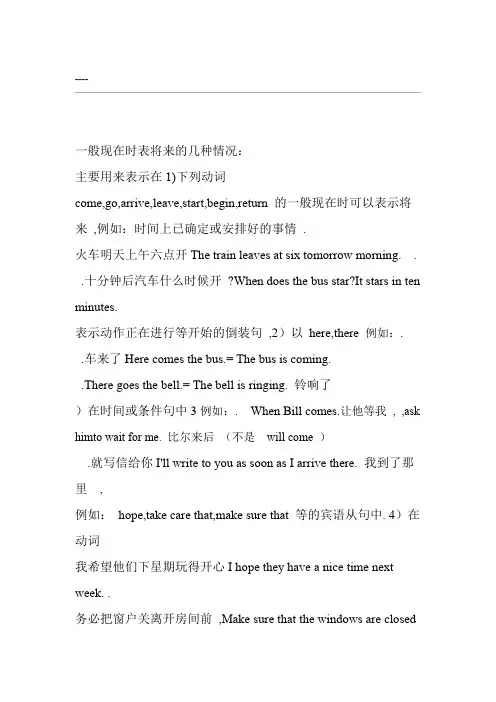
----一般现在时表将来的几种情况:主要用来表示在1)下列动词come,go,arrive,leave,start,begin,return 的一般现在时可以表示将来,例如:时间上已确定或安排好的事情.火车明天上午六点开The train leaves at six tomorrow morning. . .十分钟后汽车什么时候开?When does the bus star?It stars in ten minutes.表示动作正在进行等开始的倒装句,2)以here,there 例如:..车来了Here comes the bus.= The bus is coming..There goes the bell.= The bell is ringing. 铃响了)在时间或条件句中3例如:.When Bill comes.让他等我,,ask himto wait for me.比尔来后(不是will come).就写信给你I'll write to you as soon as I arrive there. 我到了那里,例如:hope,take care that,make sure that 等的宾语从句中. 4)在动词我希望他们下星期玩得开心I hope they have a nice time next week. .务必把窗户关离开房间前,Make sure that the windows are closedbefore you leave the room..了现在进行时除表进行外,还可以表示将来.现在进行时表将来时常用“意图”“安排”或“打算”.这种现在进行时比较生动的含义. ,给人一种期待感所用动词多是转移动词,它常表最近或较近的将来1.如:.. 要走了I (1)'m going我. .(2)我要来了I'm coming.?When are you starting? 你什么时候动身(3)如:.2.表将来的现在进行时除用于转移动词外,亦可用于某些非转移动词.后我找你课.m meeting you after classI '(1)?What are you doing next Sunday? 下星期你打算干什么(2).她不久将买一辆新自行车She is buying a new bike soon. (3)但偶尔也表示较远的将来3.如:.长大了要参军我.m joining the armyWhen I grow up,I '.如:.表将来的现在进行时有时含有4.多用在否定结构中,”的意思“决心.我.不走了(1)I 'm not going .m not waiting any longer(2)I '我.不再等了有时也用在肯定结构中5.如:.要打退堂鼓了.'I m backing out我.如:用这种现在进行时与对方讲话时可变成命令.6.不过语气比较温和,.你留下吧(1) You are staying. (2) Don'tforget:you are taking part too..不要忘记:你也要参加如:现在进行时也可在时间、条件或原因状语从句中表示将来.,同一般现在时一样7. 你什么时候路过我们家(1) when you are passing my way,please drop in. 用于时,请进来坐(.间状语从句)(2) If they are not doing it,what am I to do?用于条件状语从?(那我该怎么办,如果他们不干句)(3) She is going to the dentist tomorrow because she is having a tooth filled.如:表示将来的现在进行时也可用在间接引语中.表示说话人相信它将是事实,8..他说他明天走He said he is going tomorrow.表将来的现在进行时有时从属于将来时态9.如:.---------(1) On election night we's happening in various places inntrythis. cou ll be telling you what'到了选举的夜晚,我们将把全国各地的情况告诉大家..,会有空doing时're我both(2) when I have time,I'll come down to the school to see how you.来学校看你们俩的学习情况现在进行时态练习题一、.按要求改写句子1. The boy is playing basketball.否定句:____________________________一般疑问句:_________________________肯定回答:______________________ 否定回答:______________________对is playing basketball 提问:__________________________提问:The boy __________________________对2. They are singing in the classroom.____________________________否定句:_________________________ 一般疑问句:______________________ ____________________ 否定回答:肯定回答:对are singing 提问:__________________________提问:__________________________对in the classroom用现在进行时完成下列句子. 二、1. What _________ you __________ (do)?2. I _____________ (sing) an English song.3.What ________ he ____________ (mend)?He ______________ (mend) a car.4.______ you __________ (fly) a kite? Yes, _____________.5.______ she ___________ (sit) in the boat? 6.______ you_____________ (ask) questions? 7. We _______________ (play)games now.8. What are you _________(do) now? I ___________(eat) bread. 9. It's nine o'clock. My father_______________(work) in the office.10. Look, the boy____________(put) the rubbish into the bin.11. __________he__________(clean) the classroom? No, he isn't. He____________(play). 12. Where is Max? He___________(run) on the grass. 13. Listen, who____________(sing) in the music room? 14.Oh, Mary_____________(sing) there.过去进行时态练习题过去进行时练习:用动词的适当形式填空.1.While we __________ (wait) for the bus,a girl__________ (run) up to us.2.I __________ (telephone) a friend when Bob __________ (come) in.3.Jim __________ (jump) on the bus as it__________ (move) away.4.We __________ (test) the new machine when the electricity __________ (go) off.5.She __________ (not want) to stay in bed while theothers ________________(all,work) in the fields. 6.While mother ________ (put) Cathy to bed,the door bell ________ (ring).7.I _____ (have) my breakfast at half past six yesterday morning.---------8.Mary _____ (go) over her lessons from six to seven last night.John and peter____(do) the same thing. 9.What _____ you ___ (do) at that time?We _____ (watch) TV.10.Was your father at home yesterday evening?Yes ,he was.He _____ (listen) to theradio.11.They _____(not make) a model ship when I saw him.12._____ they ____ (have) a meeting at 4 yesterday afternoon?No,they _____.They _____ (clean) the classroom.13.______ it ______(rain) when you left school?Yes,it ____.(No,it ____)14.What _____ your father _____ (do) when he was your age?15.One day,Edison _____ (wait) for a train to arrive,and suddenly a little boy ran tothe track(轨道) to play.16.He asked me if I ______ (go) fishing that afternoon.17.The three of them werein a hurry because their plane _____ (leave) in five minutes.18.In a letter,john told us that he _____ (come) to china next month.19.When the bell rang,jenny _____ (wait) in her seat.20.She _____ (make) her dress the whole afternoon.21.While my father ____ (look) through the evening paper,he suddenly ____ a cry.-----。
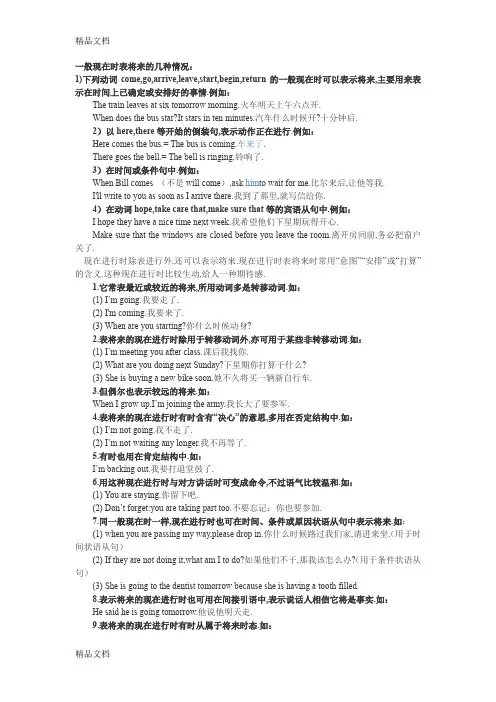
一般现在时表将来的几种情况:1)下列动词come,go,arrive,leave,start,begin,return的一般现在时可以表示将来,主要用来表示在时间上已确定或安排好的事情.例如:The train leaves at six tomorrow morning.火车明天上午六点开.When does the bus star?It stars in ten minutes.汽车什么时候开?十分钟后.2)以here,there等开始的倒装句,表示动作正在进行.例如:Here comes the bus.= The bus is coming.车来了.There goes the bell.= The bell is ringing.铃响了.3)在时间或条件句中.例如:When Bill comes (不是will come),ask him to wait for me.比尔来后,让他等我.I'll write to you as soon as I arrive there.我到了那里,就写信给你.4)在动词hope,take care that,make sure that等的宾语从句中.例如:I hope they have a nice time next week.我希望他们下星期玩得开心.Make sure that the windows are closed before you leave the room.离开房间前,务必把窗户关了.现在进行时除表进行外,还可以表示将来.现在进行时表将来时常用“意图”“安排”或“打算”的含义.这种现在进行时比较生动,给人一种期待感.1.它常表最近或较近的将来,所用动词多是转移动词.如:(1) I’m going.我要走了.(2) I'm coming.我要来了.(3) When are you starting?你什么时候动身?2.表将来的现在进行时除用于转移动词外,亦可用于某些非转移动词.如:(1) I’m meeting you after class.课后我找你.(2) What are you doing next Sunday?下星期你打算干什么?(3) She is buying a new bike soon.她不久将买一辆新自行车.3.但偶尔也表示较远的将来.如:When I grow up,I’m joining the army.我长大了要参军.4.表将来的现在进行时有时含有“决心”的意思,多用在否定结构中.如:(1) I’m not going.我不走了.(2) I’m not waiting any longer.我不再等了.5.有时也用在肯定结构中.如:I’m backing out.我要打退堂鼓了.6.用这种现在进行时与对方讲话时可变成命令,不过语气比较温和.如:(1) You are staying.你留下吧.(2) Don’t forget:you are taking part too.不要忘记:你也要参加.7.同一般现在时一样,现在进行时也可在时间、条件或原因状语从句中表示将来.如:(1) when you are passing my way,please drop in.你什么时候路过我们家,请进来坐.(用于时间状语从句)(2) If they are not doing it,what am I to do?如果他们不干,那我该怎么办?(用于条件状语从句)(3) She is going to the dentist tomorrow because she is having a tooth filled.8.表示将来的现在进行时也可用在间接引语中,表示说话人相信它将是事实.如:He said he is going tomorrow.他说他明天走.9.表将来的现在进行时有时从属于将来时态.如:(1) On election night we’ll be telling you what’s happening in various places in this country.到了选举的夜晚,我们将把全国各地的情况告诉大家.(2) when I have time,I’ll come down to the school to see how you’re both doing.我有空时,会来学校看你们俩的学习情况.现在进行时态练习题一、.按要求改写句子1. The boy is playing basketball.否定句:____________________________一般疑问句:_________________________肯定回答:______________________否定回答:______________________对"is playing basketball"提问:__________________________对"The boy"提问:__________________________2. They are singing in the classroom.否定句:____________________________一般疑问句:_________________________肯定回答:____________________否定回答:______________________对"are singing"提问:__________________________对"in the classroom"提问:__________________________二、. 用现在进行时完成下列句子1. What _________ you __________ (do)?2. I _____________ (sing) an English song.3. What ________ he ____________ (mend)?4. He ______________ (mend) a car.5. ______ you __________ (fly) a kite? Yes, _____________.6. ______ she ___________ (sit) in the boat?7. ______ you _____________ (ask) questions?8. We _______________ (play) games now.9. What are you _________(do) now? I ___________(eat) bread.10. It's nine o'clock. My father_______________(work) in the office.11. Look, the boy____________(put) the rubbish into the bin.12. __________he__________(clean) the classroom? No, he isn't. He____________(play).13. Where is Max? He___________(run) on the grass.14. Listen, who____________(sing) in the music room?Oh, Mary_____________(sing) there.过去进行时态练习题过去进行时练习:用动词的适当形式填空.1.While we __________ (wait) for the bus,a girl __________ (run) up to us.2.I __________ (telephone) a friend when Bob __________ (come) in.3.Jim __________ (jump) on the bus as it __________ (move) away.4.We __________ (test) the new machine when the electricity __________ (go) off.5.She __________ (not want) to stay in bed while the others ________________ (all,work) in the fields.6.While mother ________ (put) Cathy to bed,the door bell ________ (ring).7.I _____ (have) my breakfast at half past six yesterday morning.8.Mary _____ (go) over her lessons from six to seven last night.John and peter____(do) the same thing.9.What _____ you ___ (do) at that time?We _____ (watch) TV.10.Was your father at home yesterday evening?Yes ,he was.He _____ (listen) to the radio.11.They _____(not make) a model ship when I saw him.12._____ they ____ (have) a meeting at 4 yesterday afternoon?No,they _____.They _____ (clean) the classroom.13.______ it ______(rain) when you left school?Yes,it ____.(No,it ____)14.What _____ your father _____ (do) when he was your age?15.One day,Edison _____ (wait) for a train to arrive,and suddenly a little boy ran to the track(轨道) to play.16.He asked me if I ______ (go) fishing that afternoon.17.The three of them were in a hurry because their plane _____ (leave) in five minutes.18.In a letter,john told us that he _____ (come) to china next month.19.When the bell rang,jenny _____ (wait) in her seat.20.She _____ (make) her dress the whole afternoon.21.While my father ____ (look) through the evening paper,he suddenly ____ a cry.。
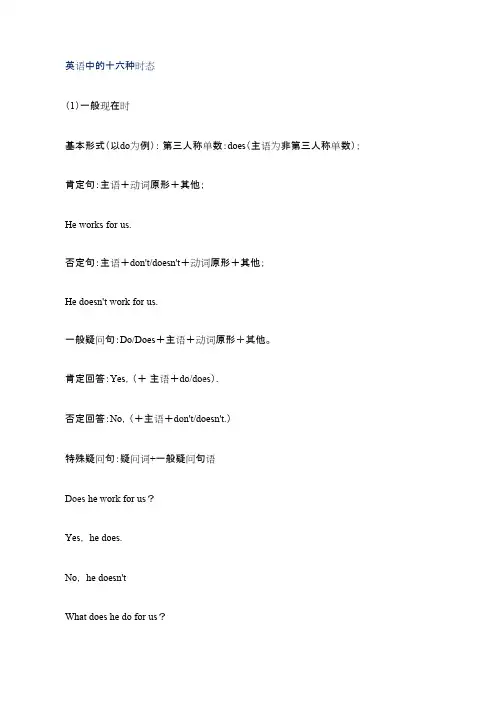
英语中的十六种时态(1)一般现在时基本形式(以do为例):第三人称单数:does(主语为非第三人称单数);肯定句:主语+动词原形+其他;He works for us.否定句:主语+don't/doesn't+动词原形+其他;He doesn't work for us.一般疑问句:Do/Does+主语+动词原形+其他。
肯定回答:Yes,(+主语+do/does).否定回答:No,(+主语+don't/doesn't.)特殊疑问句:疑问词+一般疑问句语Does he work for us?Yes, he does.No, he doesn'tWhat does he do for us?He works for us.(2)一般过去时be动词+行为动词的过去式否定句式:在行为动词前加didn't,同时还原行为动词,或was/were+not;was或were放于句首;用助动词do的过去式did提问,同时还原行为动词例如: Did he work for us?He didn't work for us.He worked for us.(3)一般将来时am/are/is+going to+do 或will/shall+doam/is/are/about to + doam/is/are to + do;一般将来时的表达方法be going to +动词原形be +不定式,be to+动词原形,be about to +动词原形be able to +不定式be about to+动词原形will + 动词原形;例如:He is going to work for us.He will work for us;He is coming.这是特殊的用一般现在时表达将来时态的例子!!(4)过去将来时be(was,were)going to+动词原形be(was,were)about to+动词原形be(was,were)to+动词原形肯定句:主语+be(was,were)going to+动词原形~.否定句:主语+be(was,were)not going to+动词原形~.疑问句:Be(Was,Were)+主语+going to+动词原形~?肯定句:主语+would(should)+动词原形~.否定句:主语+would(should)not+动词原形~.疑问句:Would(Should)+主语+动词原形~?He would work for us.(5)现在进行时主语+be+v.ing〔现在分词〕形式(其中v表示动词)表示现在正在进行的动作或最近在做的事。

详解一般现在时表将来(9种规律)一、当主句为将来时态或表示将来意义时,时间和条件的状语从句必须用一般现在时表将来:I’ll write to her when I have time. 我有空会给她写信。
Turn off the lights before you l eave. 走前关灯。
If we hurry, we may catch the bus. 如果赶紧走我们可能赶得上公共汽车。
Tell me in case you get into difficulty. 遇到困难请告诉我。
【注】① 除表示时间和条件的状语从句外,表示让步、相似、比例的从句也必须用一般现在时表示将来:I’ll foll ow him wherever he goes. 他去哪儿,我就跟着去哪儿。
Whatever you say, I won’t pay. 无论你说什么,我都不会付钱。
Whether we help him or not, he will fail. 无论我们帮他与否,他都会失败。
I’ll have a good time whether I win or l ose. 赢也好,输也好,我都将会玩好。
The more you eat, the fatter you will become. 你吃得越多就会越胖。
② 另外,当主句为用将来时态时,定语从句也通常用一般现在时表将来:I’ll give you anything you ask for. 你要什么我都给你。
You can have anything I find. 我找到的任何东西你都可以拿去。
Everyone who comes first will get a present. 每个先来的人都可得到一份礼物。
二、按照英语习惯,一个句子中若主要动词已经表明了所谈论动作的时间,那么与之相关的其他动词就不必再次指明同一时间,而往往使用一个比较简单的时态,如用一般现在时表示一般将来时等。
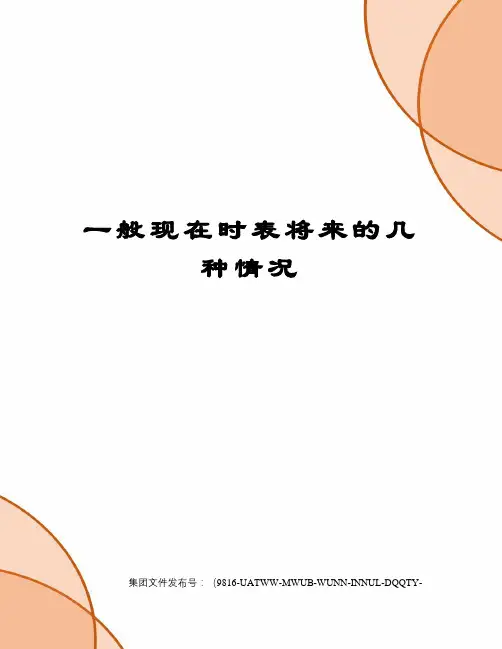
一般现在时表将来的几种情况集团文件发布号:(9816-UATWW-MWUB-WUNN-INNUL-DQQTY-一般现在时表将来的几种情况:1)下列动词come,go,arrive,leave,start,begin,return的一般现在时可以表示将来,主要用来表示在时间上已确定或安排好的事情.例如:The train leaves at six tomorrow morning.火车明天上午六点开. When does the bus starIt stars in ten minutes.汽车什么时候开十分钟后. 2)以here,there等开始的倒装句,表示动作正在进行.例如:Here comes the bus.= The bus is coming..There goes the bell.= The bell is ringing.铃响了.3)在时间或条件句中.例如:When Bill comes (不是will come),ask to wait for me.比尔来后,让他等我.I'll write to you as soon as I arrive there.我到了那里,就写信给你.4)在动词hope,take care that,make sure that等的宾语从句中.例如:I hope they have a nice time next week.我希望他们下星期玩得开心.Make sure that the windows are closed before you leave the room.离开房间前,务必把窗户关了.现在进行时除表进行外,还可以表示将来.现在进行时表将来时常用“意图”“安排”或“打算”的含义.这种现在进行时比较生动,给人一种期待感.1.它常表最近或较近的将来,所用动词多是转移动词.如:(1) I’m going.我要走了.(2) I'm coming.我要来了.(3) When are you starting你什么时候动身2.表将来的现在进行时除用于转移动词外,亦可用于某些非转移动词.如:(1) I’m meeting y ou after class.课后我找你.(2) What are you doing next Sunday下星期你打算干什么(3) She is buying a new bike soon.她不久将买一辆新自行车.3.但偶尔也表示较远的将来.如:When I grow up,I’m joining the army.我长大了要参军.4.表将来的现在进行时有时含有“决心”的意思,多用在否定结构中.如:(1) I’m not going.我不走了.(2) I’m not waiting any longer.我不再等了.5.有时也用在肯定结构中.如:I’m backing out.我要打退堂鼓了.6.用这种现在进行时与对方讲话时可变成命令,不过语气比较温和.如:(1) You are staying.你留下吧.(2) Don’t forget:you are taking part too.不要忘记:你也要参加.7.同一般现在时一样,现在进行时也可在时间、条件或原因状语从句中表示将来.如:(1) when you are passing my way,please drop in.你什么时候路过我们家,请进来坐.(用于时间状语从句)(2) If they are not doing it,what am I to do如果他们不干,那我该怎么办(用于条件状语从句)(3) She is going to the dentist tomorrow because she is having a tooth filled.8.表示将来的现在进行时也可用在间接引语中,表示说话人相信它将是事实.如:He said he is going tomorrow.他说他明天走.9.表将来的现在进行时有时从属于将来时态.如:(1) On election night we’ll be telling you what’s happening in various places in this country.到了选举的夜晚,我们将把全国各地的情况告诉大家. (2) when I have time,I’ll come down to the school to see how you’re both doing.我有空时,会来学校看你们俩的学习情况.现在进行时态练习题一、.按要求改写句子 1. The boy is playing basketball. 否定句:____________________________ 一般疑问句:_________________________ 肯定回答:______________________否定回答:______________________ 对"is playing basketball"提问:__________________________ 对"The boy"提问:__________________________ 2. They are singing in the classroom. 否定句:____________________________ 一般疑问句:_________________________肯定回答:____________________否定回答:______________________对"are singing"提问:__________________________对"in the classroom"提问:__________________________二、. 用现在进行时完成下列句子 1. What _________ you__________ (do)2. I _____________ (sing) an English song.3. What ________ he ____________ (mend) 4. He ______________ (mend) a car. 5. ______ you __________ (fly) a kite Yes,_____________. 6. ______ she ___________ (sit) in the boat 7. ______ you _____________ (ask) questions 8. We_______________ (play) games now. 9. What are you_________(do) now I ___________(eat) bread. 10. It's nineo'clock. My father_______________(work) in the office. 11. Look, the boy____________(put) the rubbish into the bin. 12.__________he__________(clean) the classroom No, he isn't.He____________(play). 13. Where is Max He___________(run) on the grass. 14. Listen, who____________(sing) in the music room Oh, Mary_____________(sing) there.过去进行时态练习题过去进行时练习:用动词的适当形式填空.1.While we __________ (wait) for the bus,a girl __________ (run) up to us.2.I __________ (telephone) a friend when Bob __________ (come) in.3.Jim __________ (jump) on the bus as it __________ (move) away.4.We __________ (test) the new machine when the electricity __________ (go) off.5.She __________ (not want) to stay in bed while the others ________________ (all,work) in the fields.6.While mother ________ (put) Cathy to bed,the door bell________ (ring).7.I _____ (have) my breakfast at half past six yesterday morning.8.Mary _____ (go) over her lessons from six to seven last night.John and peter ____(do) the same thing.9.What _____ you ___ (do) at that timeWe _____ (watch) TV.10.Was your father at home yesterday eveningYes ,he was.He _____ (listen) to the radio.11.They _____(not make) a model ship when I saw him.12._____ they ____ (have) a meeting at 4 yesterday afternoonNo,they _____.They _____ (clean) the classroom.13.______ it ______(rain) when you left schoolYes,it____.(No,it ____)14.What _____ your father _____ (do) when he was your age15.One day,Edison _____ (wait) for a train to arrive,and suddenly a little boy ran to the track(轨道) to play.16.He asked me if I ______ (go) fishing that afternoon.17.The three of them were in a hurry because their plane _____ (leave) in five minutes.18.In a letter,john told us that he _____ (come) to china next month.19.When the bell rang,jenny _____ (wait) in her seat.20.She _____ (make) her dress the wholeafternoon.21.While my father ____ (look) through the evening paper,he suddenly ____ a cry.。
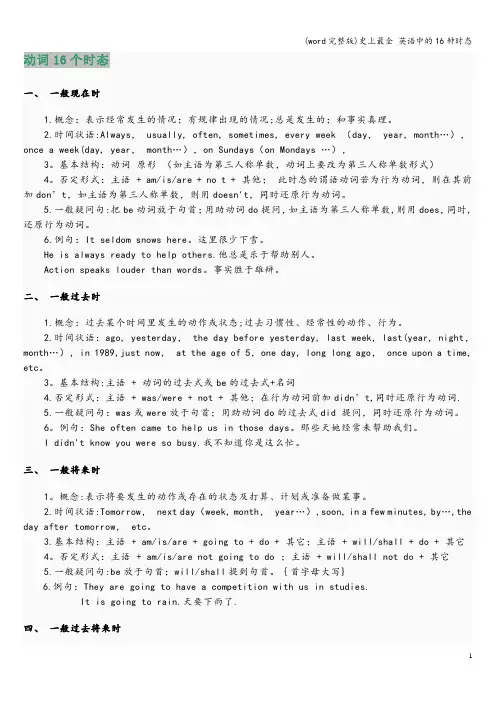
动词16个时态一、一般现在时1.概念:表示经常发生的情况;有规律出现的情况;总是发生的;和事实真理。
2.时间状语:Always, usually, often, sometimes, every week (day,year, month…),once a week(day, year,month…),on Sundays(on Mondays …),3。
基本结构:动词原形(如主语为第三人称单数,动词上要改为第三人称单数形式)4。
否定形式:主语 + am/is/are + no t + 其他;此时态的谓语动词若为行为动词,则在其前加don’t,如主语为第三人称单数,则用doesn't,同时还原行为动词。
5.一般疑问句:把be动词放于句首;用助动词do提问,如主语为第三人称单数,则用does,同时,还原行为动词。
6.例句:It seldom snows here。
这里很少下雪。
He is always ready to help others.他总是乐于帮助别人。
Action speaks louder than words。
事实胜于雄辩。
二、一般过去时1.概念:过去某个时间里发生的动作或状态;过去习惯性、经常性的动作、行为。
2.时间状语:ago, yesterday, the day before yesterday, last week, last(year, night,month…),in 1989,just now, at the age of 5,one day, long long ago, once upon a time, etc。
3。
基本结构:主语 + 动词的过去式或be的过去式+名词4.否定形式:主语 + was/were + not + 其他;在行为动词前加didn’t,同时还原行为动词.5.一般疑问句:was或were放于句首;用助动词do的过去式did 提问,同时还原行为动词。
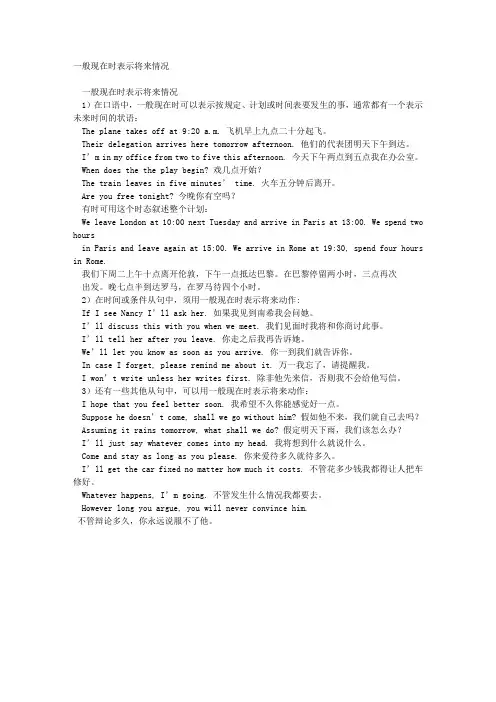
一般现在时表示将来情况一般现在时表示将来情况1)在口语中,一般现在时可以表示按规定、计划或时间表要发生的事,通常都有一个表示未来时间的状语:The plane takes off at 9:20 a.m. 飞机早上九点二十分起飞。
Their delegation arrives here tomorrow afternoon. 他们的代表团明天下午到达。
I’m in my office from two to five this afternoon. 今天下午两点到五点我在办公室。
When does the the play begin? 戏几点开始?The train leaves in five minutes’ time. 火车五分钟后离开。
Are you free tonight? 今晚你有空吗?有时可用这个时态叙述整个计划:We leave London at 10:00 next Tuesday and arrive in Paris at 13:00. We spend two hoursin Paris and leave again at 15:00. We arrive in Rome at 19:30, spend four hours in Rome.我们下周二上午十点离开伦敦,下午一点抵达巴黎。
在巴黎停留两小时,三点再次出发。
晚七点半到达罗马,在罗马待四个小时。
2)在时间或条件从句中,须用一般现在时表示将来动作:If I see Nancy I’ll ask her. 如果我见到南希我会问她。
I’ll discuss this with you when we meet. 我们见面时我将和你商讨此事。
I’ll tell her after you leave. 你走之后我再告诉她。
We’ll let you know as soon as you arrive. 你一到我们就告诉你。
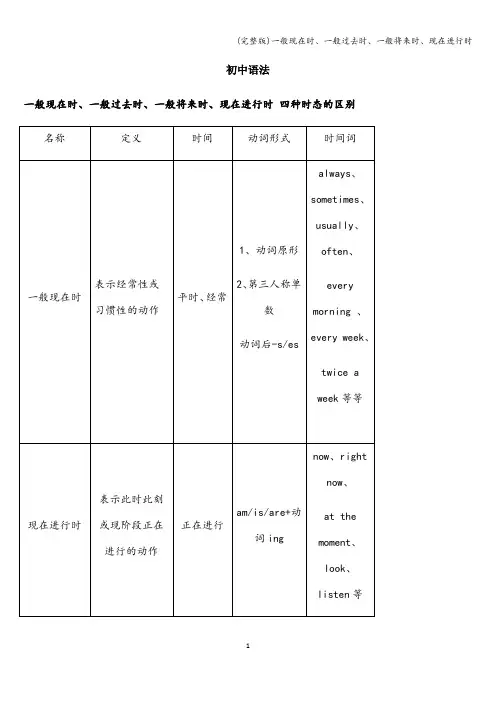
初中语法一般现在时、一般过去时、一般将来时、现在进行时四种时态的区别注意:1、一般现在时——第三人称单数的动词变化规则:1)大多数动词在词尾加“S"如:stop-______ ; make-______ read-______ ; play-______2)以辅音字母加“y”结尾的,要先将“y”变为“i",然后在加“es”如:fly-______ ; carry-______ study-______ ; worry-______3)以“s, x, ch, sh”结尾的,在词尾加“es"如:teach-______ ; watch-______4)以“o”结尾的动词,加“es”如:go-______ do-______2、现在进行时——动词ing形式的变化规则1.一般动词直接在词尾+ing例:read→______ (读) talk→______(交谈) sing→______(唱歌)2。
以不发音e结尾的动词,先去e再加ing例:like→______喜欢 write→______写 skate→______(滑冰)3。
以重读闭音节结尾且末尾只有一个辅音字母的动词,双写末尾字母,再加ing 例:stop→______(停止) get→______(得到)4.少数几个以ie结尾的动词,变ie为f再加ing.例:lie→______(躺、撒谎) tie→______(系、捆绑)3、一般过去时——动词的变化规则(1)一般在动词后加-ed。
如:play-______, offer-______, weigh—______, destroy—______, sign—______(2)在以字母e结尾的动词后,只加-d。
如:like—______, provide-______, hate - ______ date-______(3) 在以“辅音字母+y”结尾的动词后,则改y为i,再加—ed。
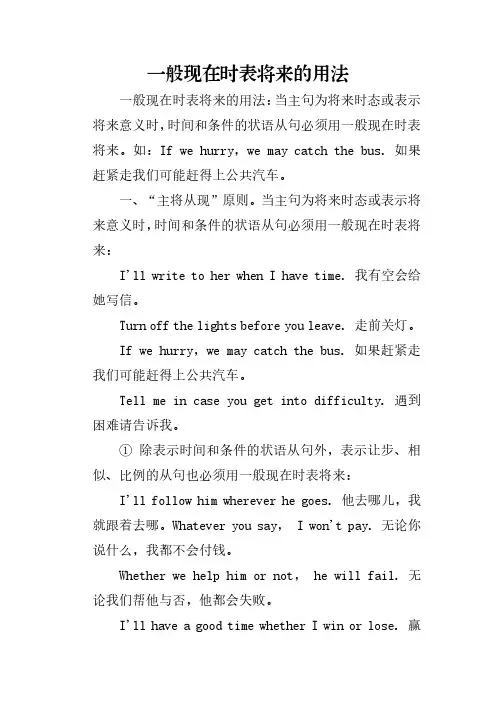
一般现在时表将来的用法一般现在时表将来的用法:当主句为将来时态或表示将来意义时,时间和条件的状语从句必须用一般现在时表将来。
如:If we hurry,we may catch the bus. 如果赶紧走我们可能赶得上公共汽车。
一、“主将从现”原则。
当主句为将来时态或表示将来意义时,时间和条件的状语从句必须用一般现在时表将来:I'll write to her when I have time. 我有空会给她写信。
Turn off the lights before you leave. 走前关灯。
If we hurry,we may catch the bus. 如果赶紧走我们可能赶得上公共汽车。
Tell me in case you get into difficulty. 遇到困难请告诉我。
①除表示时间和条件的状语从句外,表示让步、相似、比例的从句也必须用一般现在时表将来:I'll follow him wherever he goes. 他去哪儿,我就跟着去哪。
Whatever you say, I won't pay. 无论你说什么,我都不会付钱。
Whether we help him or not, he will fail. 无论我们帮他与否,他都会失败。
I'll have a good time whether I win or lose. 赢也好,输也好,我都将会玩好。
The more you eat, the fatter you will become.②另外,当主句为用将来时态时,定语从句也通常用一般现在时表将来: I'll give you anything you ask for. 你要什么我都给你。
You can have anything I find. 我找到的任何东西你都可以拿去。
Everyone who comes first will get a present. 每个先来的人都可得到一份礼物。
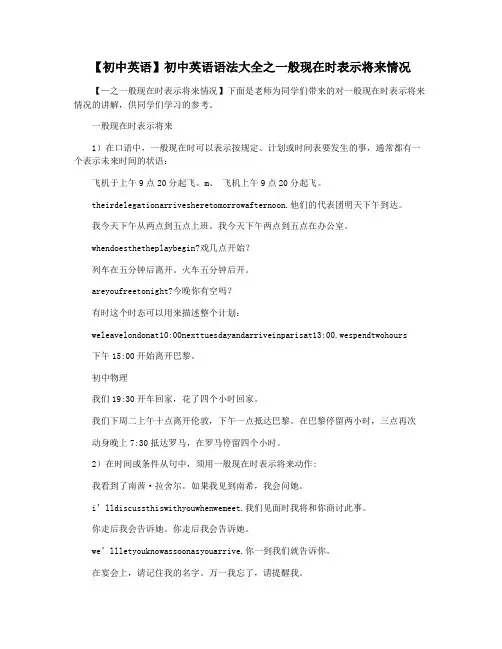
【初中英语】初中英语语法大全之一般现在时表示将来情况【—之一般现在时表示将来情况】下面是老师为同学们带来的对一般现在时表示将来情况的讲解,供同学们学习的参考。
一般现在时表示将来1)在口语中,一般现在时可以表示按规定、计划或时间表要发生的事,通常都有一个表示未来时间的状语:飞机于上午9点20分起飞。
m、飞机上午9点20分起飞。
theirdelegationarrivesheretomorrowafternoon.他们的代表团明天下午到达。
我今天下午从两点到五点上班。
我今天下午两点到五点在办公室。
whendoesthetheplaybegin?戏几点开始?列车在五分钟后离开。
火车五分钟后开。
areyoufreetonight?今晚你有空吗?有时这个时态可以用来描述整个计划:weleavelondonat10:00nexttuesdayandarriveinparisat13:00.wespendtwohours 下午15:00开始离开巴黎。
初中物理我们19:30开车回家,花了四个小时回家。
我们下周二上午十点离开伦敦,下午一点抵达巴黎。
在巴黎停留两小时,三点再次动身晚上7:30抵达罗马,在罗马停留四个小时。
2)在时间或条件从句中,须用一般现在时表示将来动作:我看到了南茜·拉舍尔。
如果我见到南希,我会问她。
i’lldiscussthiswithyouwhenwemeet.我们见面时我将和你商讨此事。
你走后我会告诉她。
你走后我会告诉她。
we’llletyouknowassoonasyouarriv e.你一到我们就告诉你。
在宴会上,请记住我的名字。
万一我忘了,请提醒我。
iwon’twriteunlessherwritesfirst.除非他先来信,否则我不会给他写信。
3)在其他一些子句中,我们可以用一般现在时来表示将来的动作:ihopethatyoufeelbettersoon.我希望不久你能感觉好一点。
高中英语一般现在时表示将来的用法高中英语一般现在时表示将来的用法在高中学习英语语法的时候,有很多高三学生对于英语的一般现在时表示将来的用法不太理解,那么就为大家整理了一些一般现在时表示将来的用法和例子,希望能对大家英语成绩提高有些帮助。
按照英语习惯,一个句子中若主要动词已经表明了所谈论动作的时间,那么与之相关的其他动词就不必再次指明同一时间,而往往使用一个比较简单的时态,如用一般现在时表示一般将来时等。
比较: This discovery means that we will spend less on food.这一发现意味着我们将减少在食品上的花费。
在I hope , I bet, see (to it) 等后的宾语从句中通常用一般现在时表示将来意义,但有时也可直接用将来时态:I hope that you like [will like] it. 你希望你会喜欢它。
I bet it rains [will rain] tomorrow. 我打赌明天会下雨。
See (to it) that children don’t catch cold. 当心别让孩子感冒。
在as, than 引出的比较状语从句中可用一般现在时表示将来,也可直接用将来时态:We’ll get there as soon as you do [will]. 你一到,我们就到。
We’ll probably drive faster than you do [will]. 我们开车很可能比你快。
几种值得注意的情况在make sure(弄清楚),make certain(弄清楚),take care(注意,当心),be careful(注意,当心),mind(注意),watch(注意)等后的that从句中通常也只用一般现在时表将来意义:Take care that it does not occur again. 注意别再发生这样的事。
高考英语语法:一般现在时表将来的若干情形一“for+宾语+不定式”是英语中一个十分有用的结构,不仅在阅读理解中经常出现,而且,如果同学们在书面表达中能巧妙地运用它,将会增添文章亮点,提高文章的档次。
为帮助同学们正确理解和掌握这一结构,本文对这一结构的一、用于时间和条件状语从句当主句为将来时态或表示将来意义时,时间和条件的状语从句必须用一般现在时表将来。
如:I’ll write to her when I have time. 我有空会给她写信。
Turn off the lights before you leave. 走前关灯。
If we hurry, we may catch the bus. 如果赶紧走我们可能赶得上公共汽车。
Tell me in case you get into trouble. 遇到麻烦请告诉我。
二、用于让步和相似状语从句当主句为将来时态或表示将来意义时,表示让步、相似、比例的从句也必须用一般现在时表示将来。
如:I’ll follow him wherever he goes. 他去哪儿,我就跟着去哪儿。
Wh atever you say, I won’t pay. 无论你说什么,我都不会付钱。
Whether we help him or not, he will fail. 无论我们帮他与否,他都会失败。
I’ll have a good time whether I win or lose. 赢也好,输也好,我都将会玩好。
The more you eat, the fatter you will become. 你吃得越多就会越胖。
三、用于定语从句中当主句为将来时态时,定语从句也通常用一般现在时表将来。
如:I’ll give you anything you ask for. 你要什么我都给你。
You can have anything I find. 我找到的任何东西你都可以拿去。
一般现在时表将来的情况(一)情形一:当主句为将来时态或表示将来意义时,时间和条件的状语从句必须用一般现在时表将来。
如:I’ll write to her when I have time. 我有空会给她写信。
Turn off the lights before you leave. 走前关灯。
If we hurry, we may catch the bus. 如果赶紧走我们可能赶得上公共汽车。
Tell me in case you get into trouble. 遇到麻烦请告诉我。
情形二:当主句为将来时态或表示将来意义时,表示让步、相似、比例的从句也必须用一般现在时表示将来。
如:I’ll follow him wherever he goes. 他去哪儿,我就跟着去哪儿。
Whatever you say, I won’t pay. 无论你说什么,我都不会付钱。
Whether we help him or not, he will fail. 无论我们帮他与否,他都会失败。
I’ll have a good time whether I win or lose. 赢也好,输也好,我都将会玩好。
The more you eat, the fatter you will become. 你吃得越多就会越胖。
情形三:当主句为将来时态时,定语从句也通常用一般现在时表将来。
如:I’ll give you anything you ask for. 你要什么我都给你。
You can have anything I find. 我找到的任何东西你都可以拿去。
Everyone who comes first will get a present. 每个先来的人都可得到一份礼物。
情形四:按照英语习惯,一个句子中若主要动词已经表明了所谈论动作的时间,那么与之相关的其他动词就不必再次指明同一时间,而往往使用一个比较简单的时态,如用一般现在时表示一般将来时等。
在一些情况下,一般现在时能用来表示将来时。
1. 谓语动词是:come,go,arrive,leave,start,begin,return,live,fly 等,可以表示将来发生的动作。
The train leaves at six tomorrow morning.When does the bus start? It starts in ten minutes.2. 在时间或条件从句中,一般要用一般现在时表示将来,而不用一般将来时。
When Bill comes,ask him to wait for me.I'll write to you as soon as I arrive there.3. 谓语动词是hope,take care that,make sure that 等后的宾语从句中,用一般现在时表示将来。
I hope they have a nice time next week.Make sure that the windows are closed before you leave the room.4.这种时态可以和一个时间短语连用以表示已确定的、对将来的安排:如:The boys start school on Monday.男孩们星期一开学。
I leave tonight.我今天晚上动身。
5.这一用法代替了较常用的现在进行时态:如:The boys are starting school on Monday.男孩儿们星期一就要开学了。
I’m leaving tonight.我今天晚上就动身。
6.这两种时态之间的差别是:⑴一般现在时比现在进行时具有的个人色彩更少:I’m leaving toni ght通常可能含有我决定离开的意思,但I leave tonight可指这是计划的一部分,但计划不一定是我订的。
⑵一般现在时要比现在进行时听起来更为正式。
计划开办一个新分店的百货商店很可能说Our new branch opens next week(本店新设分店下周开业),而不说Our new branch is opening next week。
英语八大时态每种形式的例句1、一般现在时:一般疑问句:Dose she go to school by bike?肯定句:She goes to school by bike.否定句:She does not go to school by bike.2、一般过去时:一般疑问句:Did you finish your homework yesterday?肯定句:I finished my homework yesterday.否定句:I did not finish my homework yesterday.3、一般将来时:一般疑问句:Will/Are you going to go fishing tomorrow?肯定句:I will/am going to go fishing tomorrow。
否定句:I won’t/am not going to fishing tomorrow。
4、现在进行时:一般疑问句:Is he playing computer game?肯定句:He is playing computer game.否定句:He i sn’t playing computer game。
5、现在完成时:一般疑问句:Have you been to Beijing?肯定句:I have been to Beijing three times。
否定句:I haven't been to Beijing.6、过去进行时:一般疑问句:Were you watching TV at 7:00a.m。
yesterday?肯定句:I was watching TV at 7:00a。
m。
yesterday.否定句:I wasn’t watching TV at 7:00a.m. yesterday.7、过去完成时:一般疑问句:Had you finished your homework when you watched the TV.肯定句:I had already finished my homework when I watched the TV。
一般现在时表将来的几种情况:1)下列动词come,go,arrive,leave,start,begin,return 的一般现在时可以表示将来,主要用来表示在时间上已确定或安排好的事情.例如:The train leaves at six tomorrow morning.火车明天上午六点开.When does the bus star?It stars in ten minutes.汽车什么时候开?十分钟后.2)以here,there 等开始的倒装句,表示动作正在进行.例如:Here comes the bus.= The bus is coming.车来了.There goes the bell.= The bell is ringing.铃响了.3)在时间或条件句中.例如:When Bill comes (不是will come),ask him to wait for me.比尔来后,让他等我.I'll write to you as soon as I arrive there.我到了那里,就写信给你.4)在动词hope,take care that,make sure that 等的宾语从句中.例如:I hope they have a nice time next week.我希望他们下星期玩得开心.Make sure that the windows are closed before you leave the room.离开房间前,务必把窗户关了.现在进行时除表进行外,还可以表示将来.现在进行时表将来时常用“意图”“安排”或“打算” 的含义.这种现在进行时比较生动,给人一种期待感.1.它常表最近或较近的将来,所用动词多是转移动词.如:(1)I’m going.我要走了.(2)I'm coming.我要来了.(3)When are you starting?你什么时候动身?2.表将来的现在进行时除用于转移动词外,亦可用于某些非转移动词.如:(1)I’m meeting you after class.课后我找你.(2)What are you doing next Sunday?下星期你打算干什么?(3)She is buying a new bike soon.她不久将买一辆新自行车.3.但偶尔也表示较远的将来.如:When I grow up,I’m joining the army.我长大了要参军.4.表将来的现在进行时有时含有“决心”的意思,多用在否定结构中.如:(1)I’m not going.我不走了.(2)I’m not waiting any longer.我不再等了.5.有时也用在肯定结构中.如:I’m backing out.我要打退堂鼓了.6.用这种现在进行时与对方讲话时可变成命令,不过语气比较温和.如:(1)You are staying.你留下吧.(2)Don’t forget:you are taking part too.不要忘记:你也要参加.7.同一般现在时一样,现在进行时也可在时间、条件或原因状语从句中表示将来.如:(1)when you are passing my way,please drop in.你什么时候路过我们家,请进来坐.(用于时间状语从句)(2)If they are not doing it,what am I to do?如果他们不干,那我该怎么办?(用于条件状语从句)(3)She is going to the dentist tomorrow because she is having a tooth filled.8.表示将来的现在进行时也可用在间接引语中,表示说话人相信它将是事实.如:He said he is going tomorrow.他说他明天走.9.表将来的现在进行时有时从属于将来时态.如:(1)On election night we’ll be telling you what’s happening in various places in this country.到了选举的夜晚,我们将把全国各地的情况告诉大家.(2)when I have time,I’ll come down to the school to see how you’re both doing.我有空时,会来学校看你们俩的学习情况.现在进行时态练习题一、.按要求改写句子1.The boy is playing basketball.否定句:一般疑问句:肯定回答:否定回答:对"is playing basketball"提问:对"The boy"提问:2.They are singing in the classroom.否定句:一般疑问句:肯定回答:否定回答:对"are singing"提问:对"in the classroom"提问:二、. 用现在进行时完成下列句子1. What you (do)?2. I (sing) an English song.3. What he (mend)?4.He (mend) a car.5.you (fly) a kite? Yes, .6.she (sit) in the boat?7.you (ask) questions?8.We (play) games now.9.What are you (do) now? I (eat) bread.10.It's nine o'clock. My father (work) in the office.11.Look, the boy (put) the rubbish into the bin.12.he (clean) the classroom? No, he isn't. He (play).13.Where is Max? He (run) on the grass.14.Listen, who (sing) in the music room?Oh, Mary (sing) there.过去进行时态练习题过去进行时练习:用动词的适当形式填空.1.While we (wait) for the bus,a girl (run) up to us.2.I (telephone) a friend when Bob (come) in.3.Jim (jump) on the bus as it (move) away.4.We (test) the new machine when the electricity (go) off.5.She (not want) to stay in bed while the others(all,work) in the fields.6.While mother (put) Cathy to bed,the door bell (ring).7.I (have) my breakfast at half past six yesterday morning.8.M ary (go) over her lessons from six to seven last night.John and peter(do) the same thing.9.W hat you (do) at that time?We (watch) TV.10.Was your father at home yesterday evening?Yes ,he was.He (listen) to the radio.11.They (not make) a model ship when I saw him.12.they (have) a meeting at 4 yesterday afternoon?No,they .They (clean) the classroom.13.it (rain) when you left school?Yes,it .(No,it )14.What your father (do) when he was your age?15.One day,Edison (wait) for a train to arrive,and suddenly a little boy ran to the track(轨道) to play.16.He asked me if I (go) fishing that afternoon.17.The three of them were in a hurry because their plane (leave) in fiveminutes.18.In a letter,john told us that he (come) to china next month.19.When the bell rang,jenny (wait) in her seat.20.She (make) her dress the whole afternoon.21.While my father (look) through the evening paper,he suddenly a cry.。
一般现在时表将来的几种情况:1)下列动词come,go,arrive4eave,start,begin,return的一般现在时可以表示将来♦主要用来表示在时间上已确定或安排好的事情.例如:The train leaves at six tomorrow morning.火车明天上午六点开.When does the bus siar?It stars in ten minutes.汽车什么时候开?十分钟后.2)以here,there等开始的倒装句,表示动作正在进行•例如:Here comes the bus・= The bus is coming.车来了.There goes the bcll・= The bell is ringing•铃响了.3)在时间或条件句中.例如:When Bill comes (不是will come) .ask hinito wait for me.比尔来后,ih他等我.ril write to you as soon as I arrive there•我到了那里,就写信给你.4)在动词hopegke care that,make sure that等的宾语从句中•例如:I hope they have a nice lime next week•我希望他们下星期玩得开心.Make sure that the windows are closed before you leave the room•离开房间前,务必把窗户关了.现在进行时除表进行外,还可以表示将来•现在进行时表将来时常用“意图”“安排“或“打算” 的含义.这种现在进行时比较生动,给人一种期待感.1.它常表最近或较近的将来,所用动词多是转移动词.如:(1)Fill going.我要走了.(2)rni coming •我要来了.(3)When are you starting?你什么时候动身?2.表将来的现在进行时除用于转移动词外,亦可用于某些非转移动词.如:(1)I'm meeting you after class.课后我找你.(2)What are you doing next Sunday?下星期你打算干什么?(3)She is buying a new bike soon.她不久将买一辆新自行车.3.但偶尔也表示较远的将来”如:When I grow up.Fm joining the army.我长大了要参军.4.表将来的现在进行时有时含有“决心”的意思,多用在否定结恂中.如:(1)I'm not gomg.我不疋了・(2)Pm not wailing any longer.我不再等了.5.有时也用在肯定结构中.如:I'm backing out•我要打退堂鼓了・6.用这种现在进行时与对方讲话时可娈成命令,不过语气比较温和.如:(1)You are slaying.你留下吧.(2)Don't forget:you are taking part tg不要忘记J你也要参加.7•同一般现在时一样,现在进行时也可在时间 ' 条件或原因状语从句中表示将来.如:(1)when you are passing my way,please drop in•你什么时候路过我们家,请进来坐.(用于时间状语从句)(2)If they are not doing it.whal am I to do?如果他们不干,那我该怎么办?(用于条件状语从句)(3)She is going to the dentist tomorrow because she is having a tooth filled.&表示将来的现在进行时也可用在间接引语中,表示说话人相信它将是事实.如:He said he is going tomorrow.他说他明天走.9•表将来的现在进行时有时从属于将来时态•如:(1)On election night we'll be telling you what's happening in various places in this country. 到了选举的夜晚,我们将把全国各地的情况告诉大家.(2) when I have tuiie^ni come down to the school to see how you*re both doing.我有空时,会 来学校看你们俩的学习情况.现在进行时态练习题 一、•按要求改写句子1- The boy ts playing basketball.否圧句:一般疑问句:肯世回答:对”is Playing basketball"提问:对叮he boy-提问:2. They are singing in the classroom. 一般疑问句:否定回答:对"are singing"提问:对"in the classroo rrT 提问:二、•用现在进行时完成下列句子否圧回答:& We(play) games now.(play).过去进行时态练习题过去进行时练习:用动词的适当形式填空.1.While we (wait) for the bus,a girl __________________ (run) up to us ・2.1 ____________ (telephone) a friend when Bob _________________________ (come) in.S.Jiin _________________ (jump) on the bus as it ___________________ (move) away.4.We ___________________ (test) the new machine when the electricity _______________________5.She __________________ (not want) to stay in bed while the others ________________________ (alLwork) in the fields.b.While mot her (put) Cathy to bed,the door bell __________________ (ring).7.1 ______ (have) my breakfast at half past six yesterday morning.8. Mary _________ (go) over her lessons from six to seven last nightJohn and peter_____ (do) the same thing.9. What _________ you _______ (do) at that tiine?We ___________ (watch) TV.10. Was your father at home yesterday evening?Yes .he was.He __________________radio.11 ・ They (not make) a model ship when I saw him. 12, ______ they (have) a meeting at 4 yesterday afternoon?No,they __________ .They _________ (clean) the classroom.13. ______ it _________ (rain) when you left schooI?Yes,it ______________ ,(No,it14・What _________ your father (do) when he was your age?15.One day,Edison _______________ (wait) for a train to arrive,and suddenly a little boy ran to the track(轨道)to play.16. He asked me if I ___________ (go) fishing that afternoon.17. The three of them were in a hurry because their plane He 9. What are you (do) now? I (eat) bread.10. It's nine o'clock. My father (work) in the office.11, Look, the boy (put) the rubbish into the bin.12. he(clean) the classroom? No, he isn't 13, Where is Max? He(run) on the grass. 14. Listen, who(sing) in the music room? Oh, Mary(sing) there.(go) off(listen) to the(leave) in fiveminutes.18.In a letterjohn told us that he ____________ (come) to china next month.19,When the bell rangjenny ____________ (wait) in her seat.20,She ________ (make) her dress the whole afternoon.21,While my father _________ (look) through the evening paper,he suddenly __________________ a cry.。